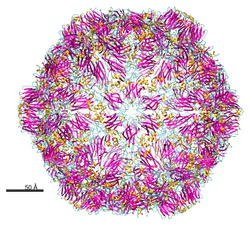Nepovirus foliumflabelli
| Literature database |
|---|
| 131 articles sorted by: |
| • year (descending) |
| • research topics |
| • countries/regions |
| • host plants |

Author(s): William M. Brown Jr.
Source: IPM Images

Source: Wikimedia Commons
Grapevine fanleaf virus (GFLV)
Assigned virus:
• grapevine fanleaf virus (GFLV)
The grapevine fanleaf virus is wide-spread and causes an important disease of grapevine. The symptoms include fanleaf-like malformation of the leaves and chlorosis. It is transmitted by nematodes (e.g. Xiphinema index), grafting and planting material. Yield losses may reach 80% and the lifespan of the vine is reduced. The most effective management option is the planting of virus-free vines.
The particles are isometric and about 30 nm in diameter. The genome consists of 2 separately encapsidated, positive-sense , single-stranded RNA molecules (RNA-1 and RNA-2). They have 7,342 and 3,774 nt respectively and one ORF each. They code for polypeptides which are then cleaved into 5 (RNA-1) and 3 (RNA-2) proteins.
| Vernacular names | |
|---|---|
| • Deutsch: | Reisigkrankheit der Rebe |
| • English: | grapevine fanleaf virus (GFLV) |
| • Español: | urticado de la vid |
| • Français: | court-noué de la vigne |